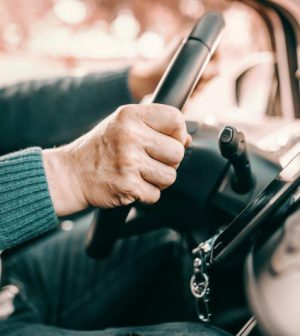- Could Your Grocery Store Meat Be Causing Recurring UTIs?
- Are You Making This Expensive Thermostat Error This Winter?
- Recognizing the Signs of Hypothyroidism
- 10 Strategies to Overcome Insomnia
- Could Artificial Sweeteners Be Aging the Brain Faster?
- Techniques for Soothing Your Nervous System
- Does the Water in Your House Smell Funny? Here’s Why
- Can a Daily Dose of Apple Cider Vinegar Actually Aid Weight Loss?
- 6 Health Beverages That Can Actually Spike Your Blood Sugar
- Treatment Options for Social Anxiety Disorder
Are Your Driving Habits Pointing to a Sleep Disorder?

Do you drive with the window open? Sip coffee behind the wheel? Blast the car radio and sing along? Fidget and fuss in the driver’s seat?
These sorts of driving habits could be a sign that you’re getting poor sleep because you suffer from sleep apnea, a new study suggests.
Folks with sleep apnea frequently employ more than three of these strategies while driving, in an attempt to remain awake and alert, British researchers found.
“Our research suggests that untreated OSA [obstructive sleep apnea] patients often use coping strategies that could be surrogate markers of sleepiness,” said researcher Dr. Akshay Dwarakanath, a consultant in respiratory medicine at the Mid Yorkshire Hospitals NHS Trust.
People with sleep apnea have breathing that stops and starts during the night, often causing them to repeatedly wake up. They also tend to snore loudly.
“Up to one fifth of collisions on the road may be caused by fatigue or sleepiness,” Dwarakanath said. “Many OSA patients drive either for personal or for professional reasons, and there is good evidence to suggest that some patients are at increased risk of collisions on the road.”
For this study, researchers compared 119 people with sleep apnea with 105 people without the sleep disorder. All participants answered questions about their sleepiness in general, sleepiness while driving, strategies they use to stay alert and their history of driving accidents.
People with sleep apnea were more likely to use strategies to stay alert at the wheel, results show.
Nearly a third of sleep apnea patients frequently used more than three such coping strategies, while none of the people with healthy sleep used more than three, the researchers said.
Further, sleep apnea patients who used more than three strategies felt sleepier in general and more sleepy while driving. They also were far more likely to have experienced a crash — nearly 23%, compared to 2% of sleep apnea patients who used fewer coping strategies.
Coping strategies most often cited by sleep apnea patients included:
-
Opening the window.
-
Drinking tea or coffee.
-
Turning up the radio.
-
Singing or talking to themselves.
-
Chewing gum or eating.
-
Stopping for a walk, a nap or to splash their face with cold water.
-
Fidgeting or exercising.
The new study was published Jan. 17 in the journal ERJ Open Research.
Dwarakanath recommends that doctors ask patients about their driving habits as one means of ferreting out undiagnosed sleep apnea.
“Asking about these strategies in the clinic may help doctors identifying patients who are at risk of driving incidents and to advise appropriately,” Dwarakanath said in a journal news release.
More information
The Cleveland Clinic has more about sleep apnea.
SOURCE: European Respiratory Society, news release, Jan. 17, 2024
Source: HealthDay
Copyright © 2026 HealthDay. All rights reserved.










